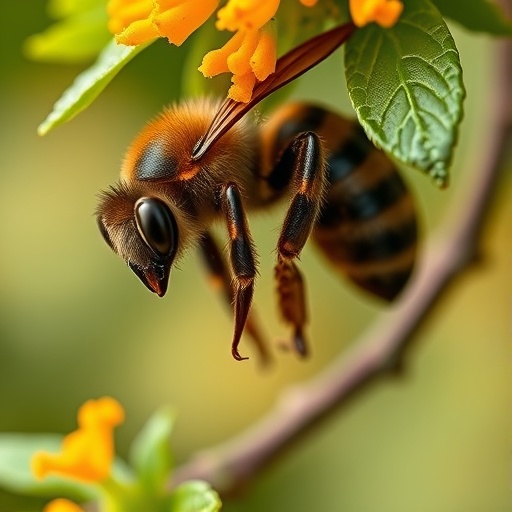In the continuous battle against cancer, one of the cornerstone chemotherapeutic agents, cisplatin, has seen widespread use due to its potent cytotoxic effects against various malignancies. Despite its efficacy, the drug’s clinical utility is often hampered by significant toxicity and the eventual development of resistance by tumor cells. Recently, a groundbreaking study published in Medical Oncology by Mohamad, El-Garhy, and Rageh introduces a promising approach to enhance cisplatin’s therapeutic index through the use of nanotechnology, specifically employing niosomal formulations loaded with propolis and chrysin as nanoadjuvants. This innovative strategy holds potential not only to improve the efficacy of cisplatin but also to mitigate its adverse side effects in vivo.
Cisplatin functions primarily by cross-linking DNA, which results in apoptosis of rapidly dividing cancer cells; however, the drawback lies in its narrow therapeutic window. The toxicity to normal tissues, including nephrotoxicity and neurotoxicity, often limits the allowable dose. Furthermore, tumor resistance mechanisms, such as enhanced DNA repair and drug efflux, significantly reduce the chemotherapeutic impact. The current research seeks to address these challenges by integrating the natural bioactive compounds propolis and chrysin into a niosomal delivery system. Niosomes, vesicular carriers structurally similar to liposomes but composed of non-ionic surfactants, provide several advantages including enhanced stability, controlled release, and the ability to encapsulate both hydrophilic and hydrophobic substances.
Propolis, a resinous substance produced by bees, and chrysin, a plant-derived flavonoid, have each been recognized for their antitumor, anti-inflammatory, and antioxidant properties. The combined use of these two agents encapsulated within niosomes offers a dual mechanism to sensitize cancer cells to cisplatin, potentially overcoming drug resistance and reducing systemic toxicity. The nanoscale encapsulation also allows for targeted delivery, maximizing the concentration of the therapeutic agents at the tumor site while sparing healthy tissues.
The in vivo investigations conducted in murine cancer models demonstrated remarkable results. When administered alongside cisplatin, the niosomal formulations of propolis and chrysin significantly enhanced tumor regression compared to cisplatin alone. Notably, the treatment groups showed a marked reduction in tumor volume accompanied by improved survival rates. Histopathological analyses revealed decreased signs of cisplatin-induced organ damage, suggesting that these nanoadjuvants have a protective effect at the cellular level.
On a molecular scale, the synergistic activity seems to be mediated through modulation of key signaling pathways involved in apoptosis and oxidative stress. Both propolis and chrysin are known to induce the mitochondrial apoptotic pathway and downregulate anti-apoptotic proteins while combating the reactive oxygen species generated by cisplatin therapy. This action not only amplifies the cancer cell killing effect but also maintains redox homeostasis in normal cells, thereby reducing off-target toxicity.
From a pharmaceutical perspective, the formulation of propolis and chrysin into niosomes enhances their bioavailability, which is generally limited due to poor solubility and rapid metabolism. The nanosized carriers facilitate improved cellular uptake through enhanced permeability and retention (EPR) effect, a phenomenon that naturally drives nanoparticles to accumulate more in tumor tissues due to their leaky vasculature. As a result, these niosomal systems provide a robust platform for controlled and sustained drug release, ensuring effective concentrations over extended periods.
The authors also emphasize the importance of niosome surface properties in optimizing delivery. By adjusting the surfactant composition and cholesterol content, the niosomes exhibited high stability and an optimal size distribution for intravenous administration. These physicochemical properties are critical to evade rapid clearance by the mononuclear phagocyte system and to achieve prolonged circulation time, further enhancing the therapeutic outcome.
Crucially, the study addresses the complex interplay between cancer treatment efficacy and safety profiles, underscoring how nanotechnology-based drug delivery can revolutionize conventional chemotherapy. The utilization of natural compounds like propolis and chrysin highlights a shift toward integrating phytochemicals with established chemotherapeutics to forge synergistic regimens that are both more effective and bear fewer side effects.
Moreover, this research contributes to a growing body of evidence supporting the use of flavonoids and bee products as adjuncts in cancer therapy. Their immunomodulatory abilities, combined with antioxidant effects, not only potentiate chemotherapy but may also enhance the patient’s overall immune response against tumoral cells. This multi-pronged approach caters to the evolving understanding that successful cancer treatment necessitates attacking the disease on several biological fronts.
The findings herald potential clinical applications, with future directions including detailed pharmacokinetic and pharmacodynamic studies to translate this approach safely into human trials. Optimizing dosage regimens, scaling up niosomal production, and evaluating long-term toxicity profiles will be vital steps in advancing this promising nanomedicine from bench to bedside.
Furthermore, such nanoscale co-delivery systems can be adapted to other chemotherapeutic agents and phytochemicals, suggesting a versatile platform capable of customizing treatments according to tumor type and patient-specific factors. The precision and adaptability offered by nanotechnology could redefine personalized oncology and pave the way for more compassionate cancer care.
In summary, the innovative coupling of niosomal nanocarriers with natural adjuvants propolis and chrysin presents a compelling strategy to enhance cisplatin chemotherapy’s efficacy and safety. This synergistic drug delivery system leverages advancements in nanomedicine and natural product pharmacology to tackle longstanding challenges in chemotherapy, promising a brighter horizon for patients suffering from resistant cancers.
Subject of Research: Enhancing cisplatin chemotherapy efficacy and safety through the use of niosomal propolis and chrysin as nanoadjuvants in vivo.
Article Title: Improving cisplatin chemotherapy in vivo by niosomal propolis and chrysin as nanoadjuvants.
Article References:
Mohamad, E.A., El-Garhy, M.R. & Rageh, M.M. Improving cisplatin chemotherapy in vivo by niosomal propolis and chrysin as nanoadjuvants.
Med Oncol 42, 539 (2025). https://doi.org/10.1007/s12032-025-03105-5
Image Credits: AI Generated
DOI: https://doi.org/10.1007/s12032-025-03105-5
Tags: chrysin in cancer treatmentcisplatin chemotherapy enhancementimproving therapeutic index of chemotherapyinnovative cancer treatment strategiesmedical oncology research advancementsnanotechnology in oncologynatural compounds in chemotherapynephrotoxicity and neurotoxicity mitigationniosomal drug delivery systemsovercoming cancer drug resistancepropolis as a cancer adjuvantreducing cisplatin toxicity





